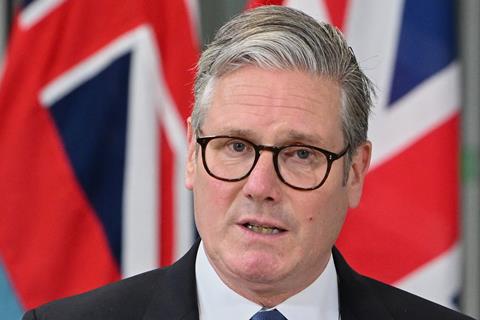Writing in response to Tim Farron MP’s article which praised Keir Starmer for spending more money on defence, Symon Hill argues that military might is an idol. Christians should be challenging the false assumption that purchasing more weapons will bring us safety, he says

The idols of militarism have been lifted high this week. Politicians from many parties have rushed either to praise Keir Starmer’s military policies or to urge him to go even further.
Starmer has announced new military spending, new arms factories, new measures to promote public support for armed force. But there is no new thinking and no new behaviour. Instead, we have seen a tired repetition of the same old militarist assumptions, accepted by nearly all politicians and most newspapers.
As Christians, let us speak up for truth and challenge these rarely questioned claims.
No deterrent
Firstly, there is the claim that weapons make us safe.
Politicians of opposing parties rarely even debate this point, so routinely do they accept it. There is much talk about increasing military spending to ‘deter’ Russia.
In reality, the UK government already has one of the world’s highest military budgets and owns enough nuclear weapons to destroy much of the world. Although NATO’s military spending is several times higher than Russia’s, this failed to deter Putin’s vile invasion of Ukraine. If we want to be realistic about opposing Putin, we must note that multi-billion military expenditure has not deterred him so far. Why should more of the same be likely to succeed?
The only thing that military spending defends is the profits of arms companies
Meanwhile neither Tory nor Labour ministers have done anything to support the peace movement within Russia or to offer asylum to Russians who refuse to fight.
We are also told that spending more on armed force will help Britain to ‘prepare’ for war. Of course, it is sometimes necessary to prepare for something while working to prevent it (for example, fire or natural disasters). But a war between nuclear-armed states is not something for which anyone can prepare.
Both sides possess weapons of mass destruction. If Russia and NATO go to war on Sunday, most of the world’s population could be dead by Monday. On Tuesday, the few remaining survivors are unlikely to care about which side had the bigger army.
This is the consequence of trusting in the false god of military might. As Jesus said as he refused to use weapons when arrested: “All who draw the sword will die by the sword” (Matthew 26:52).
Who do we serve?
Secondly, there is the claim that loyalty to a nation-state trumps other loyalties.
We ask what ‘we’ should do, meaning our government, and whether ‘we’ should fight, meaning the troops our government deploys. It is one thing to take pride in our country and support its football team. It is quite another to support a war simply because the people fighting it are employed by the government we live under. War is not a sport.
Most governments treat the lives of people ruled by their enemies as of less value than the lives of those ruled by their allies. Tory and Labour governments have rightly condemned Russian aggression in Ukraine but have sold weapons to the Saudi regime committing similar atrocities in Yemen. They rightly denounced Hamas’ despicable attack on Israelis, but they arm and encourage the Israeli government that is killing civilians in Gaza.
This is morally repugnant. As Christians seeking first the kingdom of God, we know that no state, government or army can claim our ultimate loyalty - however much we may love our country. Every human is created in the image of God and incalculably precious to God.
Safe from harm
Thirdly, there is the claim that security and defence are equivalent to preparations for war.
Five years ago, Covid-19 came as a deadly reminder that weapons cannot make us safe. As the world went into lockdown, nuclear submarines continued to patrol the seas, with no ability whatsoever to tackle the virus that was actually killing thousands of people. At the time, 19 organisations including the Peace Pledge Union and several Christian groups urged ministers to divert military budgets to tackling Covid. They were ignored
Security means defence from poverty, pandemics and climate chaos as well as oppressive regimes
Defence and security reviews in 2010, 2015 and 2018 listed epidemics or pandemics, as well as climate change and natural disasters, as serious threats to the security of the British people. Despite this, governments have effectively ignored the content of their own reviews, focusing almost entirely on military threats.
Disabled people who fear Starmer’s benefits cuts know that safety is about more than living under a well-armed government. Ministers say there is no money for such things – but there is always money for war. Security means defence from poverty, pandemics and climate chaos as well as from the threat of oppressive regimes. The only thing that military spending defends is the profits of arms companies.
An honest look
Politicians may prefer us to live in a fantasy world in which the government is allied only with democracies and bravely protects its own people from tyranny - while other dangers are conveniently forgotten about. As Christians we are called to recognise truth. Let us face up to the world as it really is and pray for God to guide us in changing it.
The alternative is to trust in the idol of militarism, built on spurious premises that are at best naïve and at worst dishonest. And a house that’s build on sand is sure to fall.
Read an alternative view by Tim Farron MP on why Keir Starmer is right to spend more on defence





































No comments yet